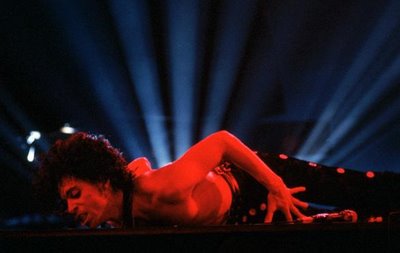Wednesday, June 25th, marks the 30th anniversary of the release of Prince and The Revolution’s Purple Rain. In honor of this, Deadshirt presents an entire week of art and essays that explore and celebrate one of the greatest albums of all time. Dig, if you will.
By Mike Duquette
We can thank Prince for a lot of things—excellent pop/rock/soul music, sweet fashion, the trajectories of at least a dozen pop stars, Gen X/Y/Z’s interest in religion, sexuality and symbology, and a dope album about Batman, of all ideas, but there are four words we could certainly shake our fist at him over: “Parental Advisory: Explicit Content.” And weirdly, he did it with one of the least characteristically bawdy tunes to his name at the time: “Darling Nikki.”
The closer of Purple Rain’s first half is another jittery broadside in the lowest points of Prince/The Kid’s relationship with Apollonia, a rising singer who decides to hitch her wagon to rival Morris Day. (The previous track, “Computer Blue,” offers a more huddled, wounded take on their rocky road, as opposed to the ballsy sneer of “Darling Nikki.”) The Kid lambastes the titular temptress, who drags our hero into a web of sin before disappearing the next morning.
It’s one of a handful of troubling gender politics in the otherwise incredibly entertaining Purple Rain film—a film, it should be noted, in which the ladykiller Day instructs his sidekick Jerome Benton to literally throw a sexual conquest (Sheila E.) into a garbage dumpster. But what makes “Darling Nikki” really fascinating is its tameness, relative to Prince’s discography at the time, anyway.
Yes, the opening couplet deeming Nikki “a sex fiend,” whose first appearance is “in a hotel lobby masturbating with a magazine” (I’ll leave it to you, gentle reader, to determine whether she’s using the actual magazine or its contents as a stimulant), is pretty outré. [That’s super gross. CENSORED. -Dylan] But it’s also not technically something that needs to be censored from radio (hello, Green Day’s “Longview”). Compare it to material from either of Prince’s last three albums: Dirty Mind features paeans to oral sex and incest, Controversy ends with a track called “Jack U Off,” and two of the singles from 1999 feature, respectively, one of the most amazing sexual metaphors of the ‘80s (“Little Red Corvette”) and the line “I sincerely want to fuck the taste out of your mouth” (“Let’s Pretend We’re Married”). Nor was “Nikki” one of the five singles from the film’s soundtrack, four of which were Top 10 hits.
And yet, “Darling Nikki” was the first song on the “Filthy Fifteen,” a list of depraved pop songs proffered by Tipper Gore’s Parents Music Resource Center in 1985. (Also tut-tutted by the PMRC: Sheena Easton’s Prince-penned “Sugar Walls,” “Strap On ‘Robbie Baby’,” by former Prince associate Vanity, Twisted Sister’s “We’re Not Gonna Take It” and Cyndi Lauper’s “She Bop.”) The PMRC also instigated a series of compelling hearings and testimonials about “filth” in rock and its crossover with free-speech issues (a subsequent episode of CNN’s Crossfire featuring rocker/censorship critic Frank Zappa makes for a fascinating way to spend a half hour), all because “Nikki” couldn’t keep it (the magazine?) in her pants.
That still begs the question: why this Prince song? Why not “Jack U Off” or “Head” instead of a song pleasantly covered by the Foo Fighters? I think the answer is pretty simple: it was there.
Last week, Deadshirt head honcho Dylan Roth posted a fascinating essay criticizing Bruce Springsteen’s Born In The U.S.A., an album I shamelessly love for many of the qualities Dylan thinks less of it for. Born In The U.S.A. was one of at least four albums released by known pop/rock quantities from 1982 to 1984 that proceeded to dominate the world’s collective consciousness despite a homogenized approach to the kind of music that made them so compelling in the first place. Springsteen traded in compelling drama for melodrama (and some crazy drum and organ reverb). The Police’s Synchronicity stopped hiding Sting’s songcraft under layers of punk, reggae and New Wave and became the band’s most famous album along with its most toothless. Even Michael Jackson’s Thriller was a multi-format blockbuster playlist for all colors and creeds instead of a tightly wound disco platter like its predecessor Off The Wall (or Destiny and Triumph, the two killer LPs Michael cut with his brothers as The Jacksons on either side of Off The Wall).
In retrospect, Purple Rain is no different. It’s shorter and leaner than its predecessor, 1999, and its greatest, most interesting moves are pretty calculated, from the bassless groove of “When Doves Cry” to the “Freebird”-esque catharsis of the closing title track. In short, it’s a pop album, which is why the really freaky stuff of the era, like “Erotic City,” was relegated to non-LP B-sides while the sexiest track on the album proper is, lyrically, the most clinical.
But at the end of the day, “Darling Nikki” serves a purpose not only in Prince’s discography as a whole, but our greater understanding of it. If Purple Rain is a Trojan horse of a pop album, “Darling Nikki” is its sexual Odysseus, the track that gets us to notice Prince’s boundary-pushing fascination with the crossroads of spirituality and sexuality. I can defend “Cover Me” as a pop song, but it ain’t got what “Darling Nikki” has, that’s for sure.
Mike Duquette is the Content Specialist for Legacy Recordings and the founder/editor of The Second Disc, a music site devoted to reissues, box sets and other repackaging of pop music.
Read more from 30 Purple Years, our tribute to Prince’s Purple Rain!


it’s especially sexy that she has him sign a waiver before starting to grind at her mansion.